
Is every company destined for freemium?
This episode might reference ProfitWell and ProfitWell Recur, which following the acquisition by Paddle is now Paddle Studios. Some information may be out of date.
Originally published: April 10, 2019
"Freemium is an acquisition model, not a revenue model."
That’s something I’ve been preaching for a long time now, because too many people think freemium is part of their pricing strategy. Even so, the debate whether you should have a free product or you shouldn’t ever go after a free product has been raging for multiple cycles over the past couple of decades.
Yet, let’s settle the debate or at least support one side over the other here by looking at the data we collected.
But first, if you like this kind of content and want to learn more, subscribe to get in the know when we release new episodes.

What we found: Freemium will be a pillar of everyone’s growth strategies in the future. This doesn’t mean you’ll have a free plan related to your current product, but you’ll still have some element of free. Here’s why.
When you look at the market, and it doesn’t really matter if you’re in B2B or in B2C, customer acquisition cost is rising substantially. A customer that cost you $100 five years ago is actually costing you $150 to $170 today, because of the density that exists in the market.
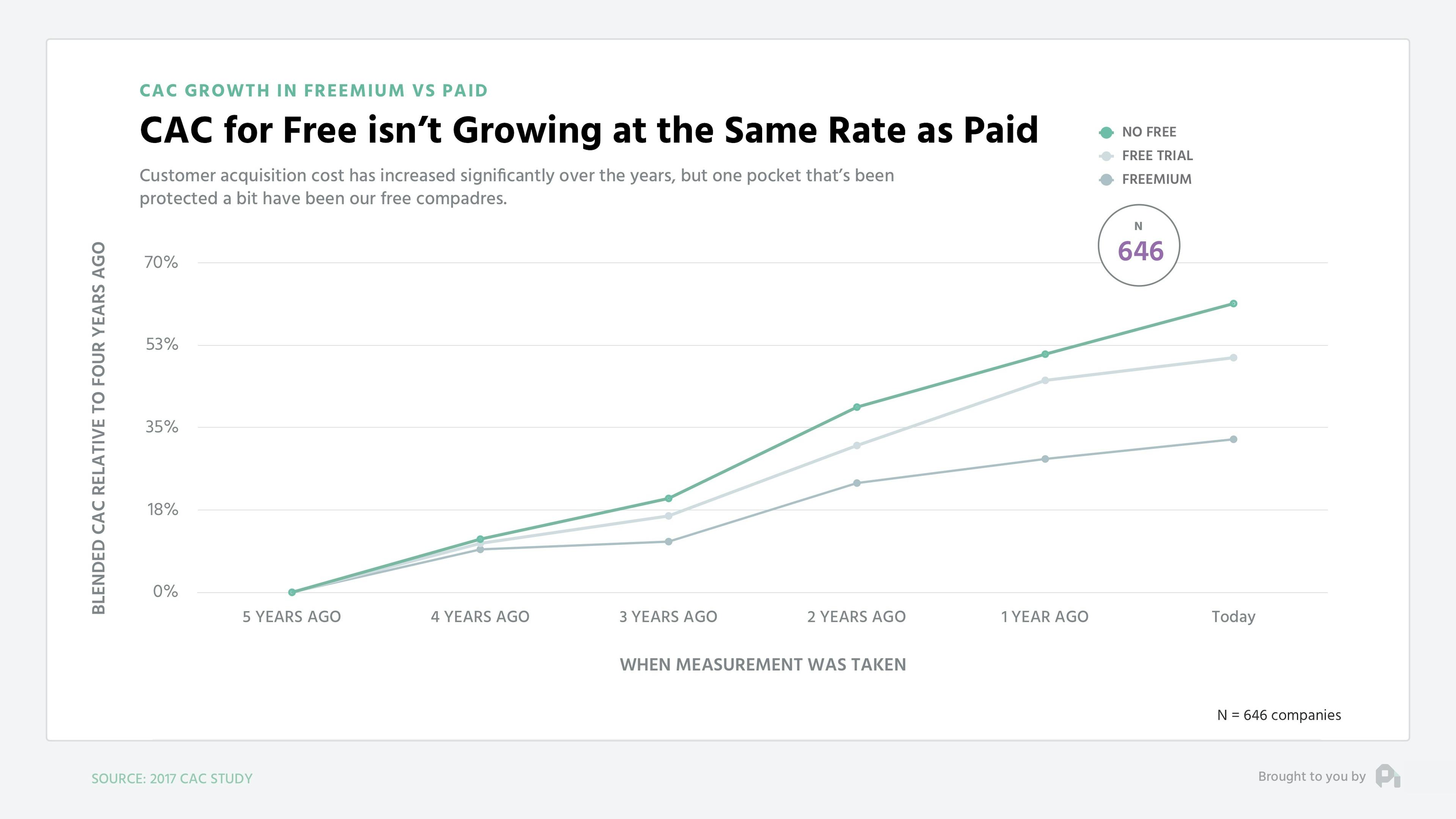
We’re all running ads. Everyone and their mother has an ebook. It’s just a dense market.
Interestingly though, CAC for customers acquired through freemium is actually almost half, and even free trials are garnering 15% less CAC on an absolute basis.
The implications of free go deeper though, because it’s not just a cost problem we’re facing in the market. The relative value of features is actually declining substantially.
As you can see here over the past five years, different features, including products’s core functionality have lost essentially 70% in terms of value and willingness to pay.
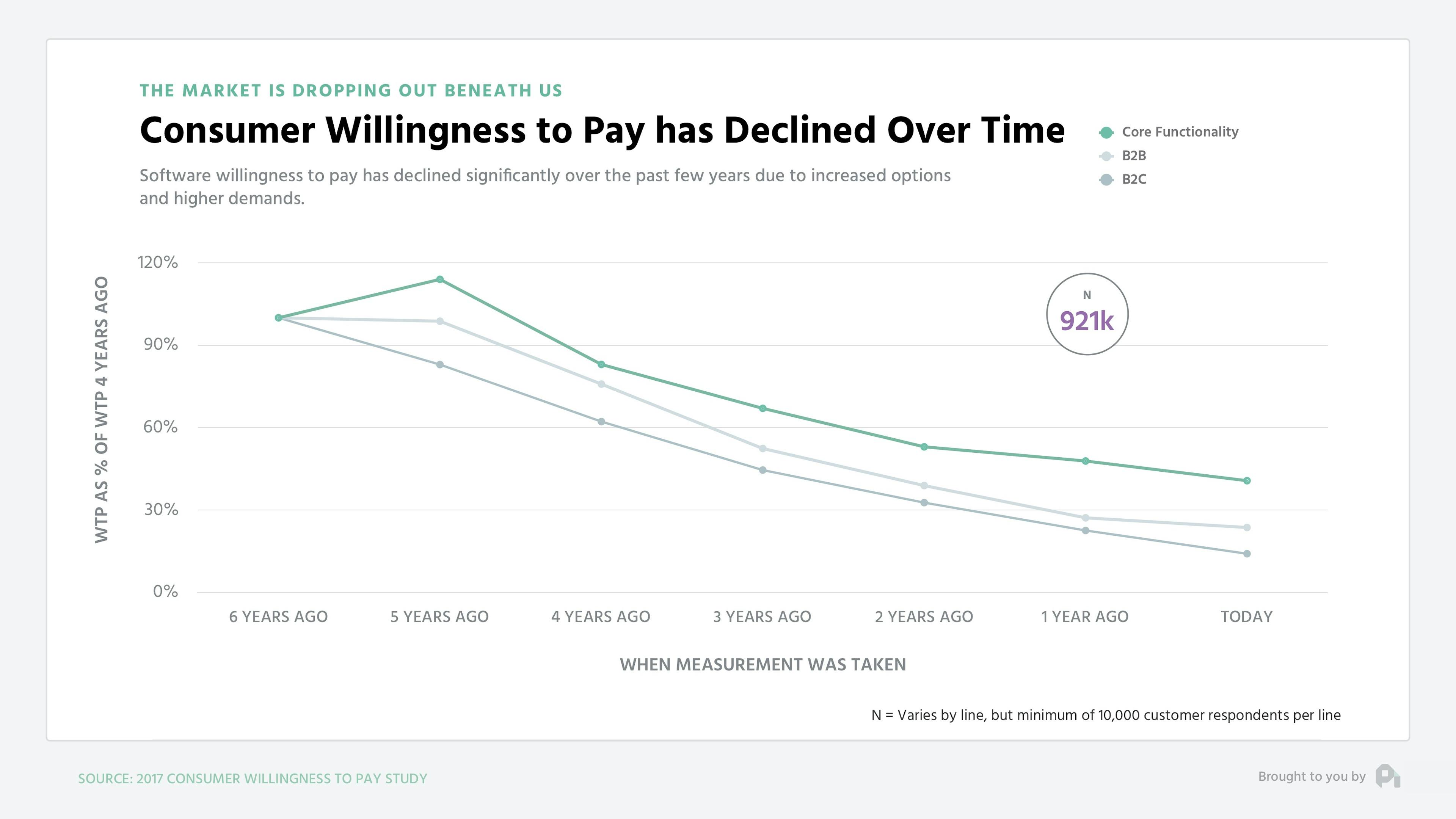
This is because there’s just a lot of product out there. The barriers to building a business, for most businesses, especially in the subscription and SaaS space is no longer building the actual technology.
All of this ease of building technology gives us the most overused slide in any marketing presentation with all of these companies on the Martech landscape, but keep in mind these are only the marketing companies.
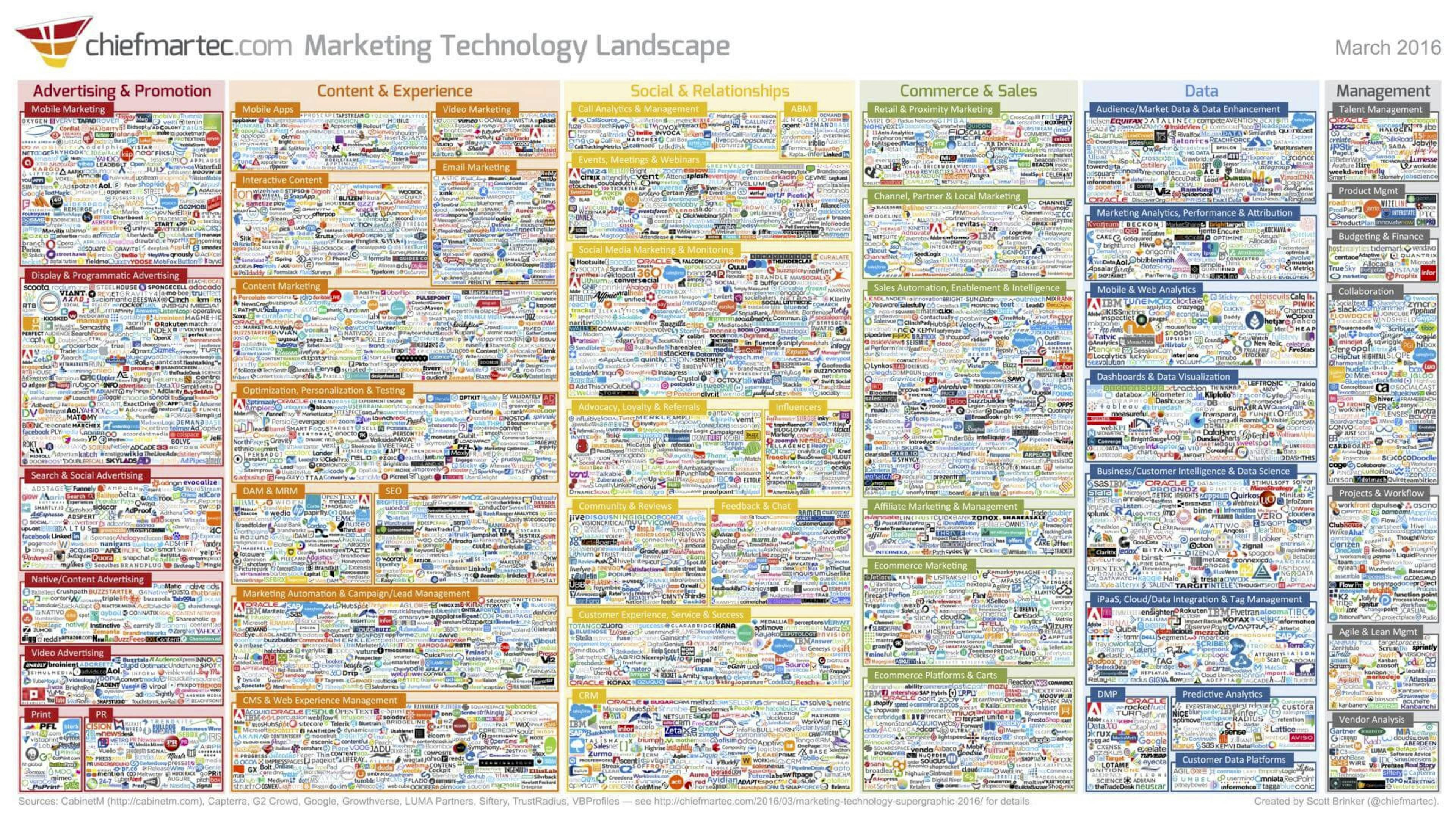
How is this connected to free though?
Well, if it’s harder and harder to acquire a customer through content and all the channels we’re currently using, and it’s easier to build product, and the relative value of product is declining, we need a way to hook people in and lower that activation energy to becoming a customer.
Free is one of the avenues to doing just that, and you see it in many of the core unit economics that stem from free. CAC as we already discussed is lower, but retention of customers who were acquired through free is also noticeably better.
Those individuals who converted from a freemium plan have nearly 20% better net retention on an absolute basis than their non-free counterparts.
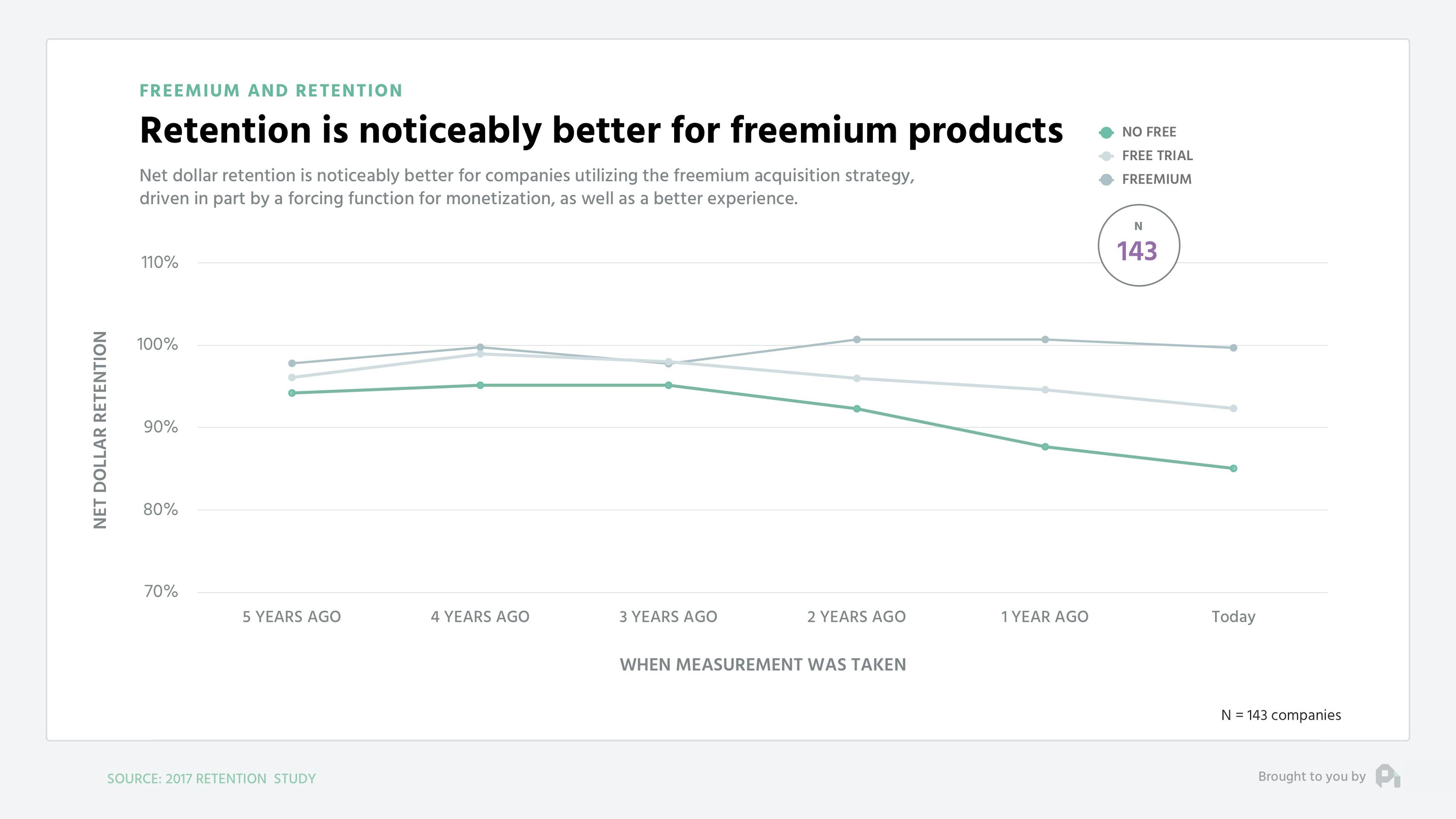
Essentially, these customers were allowed to nurture on free as long as they needed before being eased into converting to a free customer. As markets become denser and denser retention is going to be a bigger and bigger need when it comes to evaluating the customers and tactics we use long term.
Further, freemium customers tend to have much better customer satisfaction as measured through Net promoter score or NPS.
Those customers acquired through freemium means typically have double the NPS as their non-free counterparts, which is up from just over 30% higher NPS five years ago.
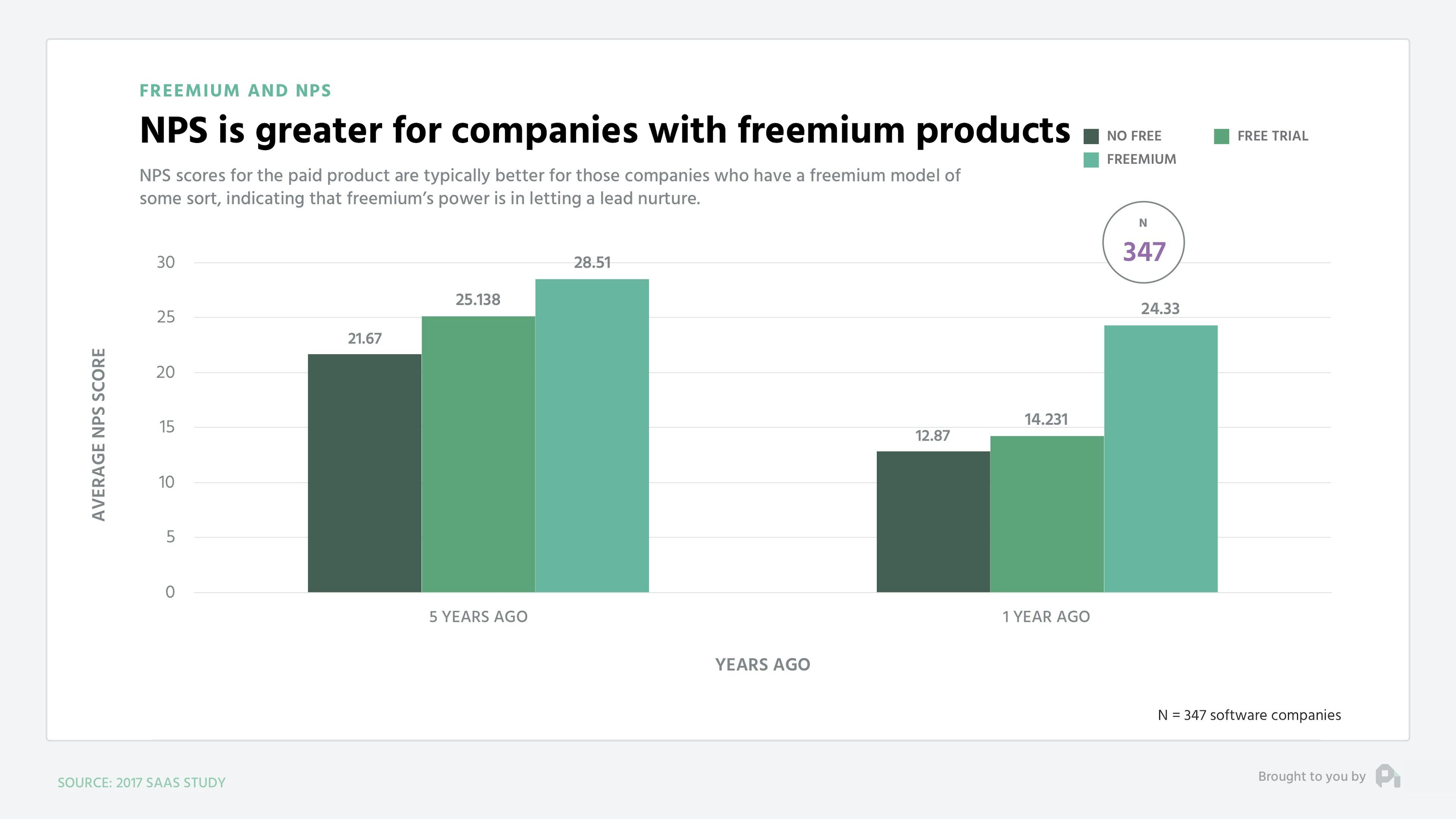
A critical piece of knowledge we’re missing involves the growth implications of freemium under most current acquisition models. Most of us just aren’t ready for a freemium push, because we’re not good enough at even converting traditional leads through high experience sales interactions and the like.
More research certainly needs to be done here to put the proverbial nail in the coffin of freemium being the future, but if I was a betting man, I wouldn’t bet against freemium, especially given all of the NPS and retention implications.
Want to learn more? Check out our recent episode on How to Burn Churn and subscribe to the show to get new episodes.

1
00:00:00,320 --> 00:00:03,520
You've got the questions,
and we have the data.
2
00:00:03,520 --> 00:00:06,620
This is the ProfitWell Report.
3
00:00:08,725 --> 00:00:09,285
Hey, Neil.
4
00:00:09,285 --> 00:00:11,205
This is David, CEO of Webforum,
5
00:00:11,205 --> 00:00:14,805
the leading Scandinavian platform
for large construction projects.
6
00:00:14,805 --> 00:00:16,130
What I'd like to know is,
7
00:00:16,130 --> 00:00:19,250
will every company have
freemium at some point?
8
00:00:19,250 --> 00:00:22,430
What's up, everyone? Neil here
for the ProfitWell Report.
9
00:00:22,530 --> 00:00:26,675
Freemium is an acquisition
model, not a revenue model.
10
00:00:26,675 --> 00:00:28,995
That's something that we've
been preaching for a long time
11
00:00:28,995 --> 00:00:32,115
now because too many people
think freemium is part of their
12
00:00:32,115 --> 00:00:33,695
pricing strategy.
13
00:00:33,720 --> 00:00:37,000
Even so, the debate whether or not
you should have a free product or
14
00:00:37,000 --> 00:00:39,960
you shouldn't ever go after a
free product has been raging
15
00:00:39,960 --> 00:00:43,165
for multiple cycles over
the past couple of decades.
16
00:00:43,165 --> 00:00:46,685
Yet let's settle the debate or
at least support one side over
17
00:00:46,685 --> 00:00:50,285
the other by answering this
question after studying a few
18
00:00:50,285 --> 00:00:52,560
thousand SaaS and
subscription companies
19
00:01:00,505 --> 00:01:01,561
This doesn't mean you'll have
to have a free plan related to
20
00:01:01,561 --> 00:01:03,365
your current product, but
you'll still have some element
21
00:01:04,105 --> 00:01:04,265
of free, and here's why.
22
00:01:04,265 --> 00:01:04,905
When you look at the market,
23
00:01:04,905 --> 00:01:07,845
and it really doesn't
matter if you're in b to
24
00:01:10,430 --> 00:01:12,430
you're in b to b or b to c,
25
00:01:12,430 --> 00:01:15,310
customer acquisition cost
is rising substantially.
26
00:01:15,310 --> 00:01:18,190
A customer that cost you a
hundred dollars five years ago
27
00:01:18,190 --> 00:01:20,235
is actually costing you a
hundred and fifty to one
28
00:01:20,235 --> 00:01:23,035
seventy today because of
the density in the market.
29
00:01:23,035 --> 00:01:26,850
We're all running ads. Everyone
and their mother has an ebook.
30
00:01:26,850 --> 00:01:28,910
It's just a dense market.
31
00:01:28,930 --> 00:01:30,450
Interestingly enough, though,
32
00:01:30,450 --> 00:01:33,810
CAC for customers acquired through
freemium is actually almost half,
33
00:01:33,810 --> 00:01:36,865
and even free trials trials are
garnering fifty percent less
34
00:01:36,865 --> 00:01:38,945
CAC on an absolute basis.
35
00:01:38,945 --> 00:01:41,105
The implications of
free go deeper, though,
36
00:01:41,105 --> 00:01:44,390
because it's not just a cost
problem we're facing in the market.
37
00:01:44,390 --> 00:01:48,290
The relative value of features is
actually declining substantially.
38
00:01:48,550 --> 00:01:51,270
As you can see here,
over the past five years,
39
00:01:51,270 --> 00:01:54,025
different features including
products core functionality,
40
00:01:54,025 --> 00:01:56,745
has lost essentially seventy
percent in terms of value and
41
00:01:56,745 --> 00:01:58,105
willingness to pay.
42
00:01:58,105 --> 00:02:00,730
This is because there's just
a lot of product out there.
43
00:02:00,730 --> 00:02:03,610
The barriers to building a
business for most businesses,
44
00:02:03,610 --> 00:02:05,770
especially in the
subscription and SaaS space,
45
00:02:05,770 --> 00:02:08,470
is no longer building
the actual technology.
46
00:02:08,475 --> 00:02:11,035
All this ease of building
technology gives us the most
47
00:02:11,035 --> 00:02:14,075
overused slide in any marketing
presentation with all these
48
00:02:14,075 --> 00:02:16,090
companies in the
martech landscape.
49
00:02:16,090 --> 00:02:19,290
But keep in mind, these are
only the marketing companies.
50
00:02:19,290 --> 00:02:21,370
How is this connected
to free, though?
51
00:02:21,370 --> 00:02:24,245
Well, if it's harder and harder
to acquire customer through
52
00:02:24,245 --> 00:02:27,365
content and all the channels
we're currently using and it's
53
00:02:27,365 --> 00:02:31,820
easier to build product and the
relative value of product is declining,
54
00:02:31,820 --> 00:02:34,540
we need a way to hook people
in and lower their activation
55
00:02:34,540 --> 00:02:36,460
energy to becoming a customer.
56
00:02:36,460 --> 00:02:38,620
Free is one of the avenues
to doing just that,
57
00:02:38,620 --> 00:02:41,675
and you see in many of the core unit
economics economics that stem from free.
58
00:02:41,675 --> 00:02:42,660
CAC, as we already
discussed, is lower,
59
00:02:42,660 --> 00:02:42,783
but retention of customers who
are acquired through free is
60
00:02:42,783 --> 00:02:44,135
also noticeably better.
61
00:02:49,280 --> 00:02:52,400
Those individuals who converted
from a freemium plan have
62
00:02:52,400 --> 00:02:55,200
nearly twenty percent better
net retention on an absolute
63
00:02:55,200 --> 00:02:58,615
basis than their non
free Essentially,
64
00:02:58,615 --> 00:03:01,735
these customers were allowed to
nurture on free as long as it
65
00:03:01,735 --> 00:03:05,170
needed before being eased into
converting to a free customer.
66
00:03:05,190 --> 00:03:07,190
As markets become
denser and denser,
67
00:03:07,190 --> 00:03:10,150
retention is gonna be a bigger
and bigger need when it comes
68
00:03:10,150 --> 00:03:13,915
to evaluating the customers
and tactics we use long term.
69
00:03:13,915 --> 00:03:17,275
Further, freemium customers tend
to have much better customer
70
00:03:17,275 --> 00:03:19,755
satisfaction as measured
through net promoter score or
71
00:03:19,755 --> 00:03:20,855
NPS.
72
00:03:20,970 --> 00:03:23,370
Those customers acquired
through freemium means
73
00:03:23,370 --> 00:03:26,650
typically have double the MPS
as their non free counterparts,
74
00:03:26,650 --> 00:03:30,265
which is up from just over thirty
percent higher MPS five years ago.
75
00:03:30,265 --> 00:03:32,585
A critical piece of the
knowledge we're missing here
76
00:03:32,585 --> 00:03:35,065
involves the growth
implications of freemium under
77
00:03:35,065 --> 00:03:37,280
most current acquisition models.
78
00:03:37,280 --> 00:03:40,400
Most of us just aren't ready
for a freemium push because
79
00:03:40,400 --> 00:03:43,440
we're not that good even at
converting traditional leads
80
00:03:43,440 --> 00:03:46,565
through high experience sales
interactions and the like.
81
00:03:46,585 --> 00:03:49,145
More research needs to be done
here to really put the nail in
82
00:03:49,145 --> 00:03:51,865
the coffin on freemium
being the future.
83
00:03:51,865 --> 00:03:55,420
But if I was a betting man, I
would not bet against freemium,
84
00:03:55,420 --> 00:03:58,620
especially given all the NPS
and retention implications.
85
00:03:58,620 --> 00:04:00,060
Well, that's all for now.
86
00:04:00,060 --> 00:04:01,180
If you have a question,
87
00:04:01,180 --> 00:04:04,375
send me an an email or video
to Neil at profit well dot com.
88
00:04:04,375 --> 00:04:07,335
And if you got value today or
for any of our other episodes,
89
00:04:07,335 --> 00:04:09,655
we appreciate any and all
shares on Twitter and LinkedIn
90
00:04:09,655 --> 00:04:12,050
because that's that's how
we know to keep doing this.
91
00:04:12,050 --> 00:04:14,030
I will see you next week.
92
00:04:15,970 --> 00:04:19,005
This week's episode is brought
to you by ProfitWell Retain.
93
00:04:19,005 --> 00:04:22,765
Radically reduce your delinquent
churn and stop losing revenue.
94
00:04:22,765 --> 00:04:25,465
Profit well dot
com slash retain.






